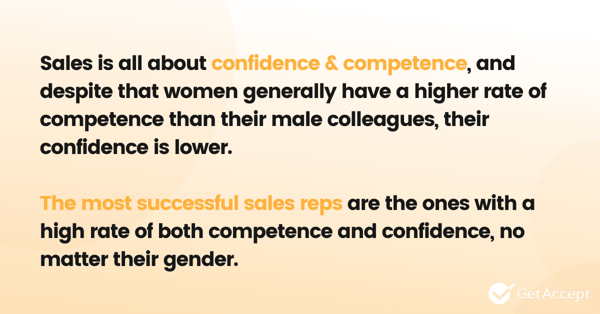In my opinion, being a salesman is the best job there is. For me, selling means doing your very best to find the best possible solution for your customers.
I have many years of experience from selling, but early on I decided to be open-minded and learn new things. My motto is that you are still learning. My curiosity drives me to constantly finding answers for new questions and concerns that me, my colleagues, clients, or partners have.
Some of the well-known and very relevant questions I always come back to are:
Is there any actual difference between female and male sellers? Are their performance and ability to deliver results differently? Are male and female salesmen driven by different ideas? Do they focus more or less on different parts of the sales process or customer relationship?
Driven by my curiosity, of course, I tried to find an answer to these questions, and I started by searching for statistics about exactly this. I found a fascinating article from Forbes, "why we need more women in sales", that particularly identified two things I found very interesting:
- Among top sellers, there are 63% more women than men
- Among these top sellers, the women sold as much as 75% more than the male sellers
How to attract, develop, and retain female sellers, please go to article 3; 5 tips on how to attract female (top)sellers.
While it constantly seems relevant to understand these differences between the female and male approach on selling, it surprised me how little research, besides the one mention above, there was in this. That is why I decided to do my own research.
Please read more about this in article 2: Are there any differences between women and men when it comes to preferences or motivations in selling? On which questions were asked and further insights into the matter.
As many sellers have their personal LinkedIn account and also usually are active within the network, I perceived an opportunity to share my questionnaire survey on LinkedIn to get as many answers as possible in a simple way. So saying, female, as well as male seller, answered the same questions so that I could compare any differences in their answers.
My thesis was obvious, there is no major difference between female and male sellers when it comes to their motivations or achievements, but it is all about the particular characters and motives, as well as how they manage to fulfill the currently required expectations in general.
Still today, there is a tiresome and (and old-fashioned) view of a seller as being the crazy, amoral person who will do anything to get a commission (just think of: The Wolf of Wallstreet), and unfortunately, this is also the image that you will find if you search on Google on the word ”seller”…
Instead, if we consider how the shopping behavior of the customers (B2B) has changed, we soon realize that there are completely new demands on sellers today:
- Nowadays, the customer knows a lot more due to all the easily accessible online information, both on websites of suppliers, but also from service reviews on sites such as G2 Crowd, Trustpilot, or Reco. A buyer who is considering a purchase spend as little as 17% of his time meeting potential suppliers. The rest of the time they spend on other things, such as collecting information. Therefore, the informational imbalance has moved from seller to buyer.
- Buyers today find that their purchasing and decision-making process is to a large extent complex and difficult.
- The number of decision-makers involved in a purchase has also changed and increased at a rapid rate. An increase of + 79% only in recent years, from 5.4 people to 6.8 people on average.
So let’s consider how the above mention facts reflect the demands on today's’ sellers, and how they will have to live up to the expectations from the new, modern buyer. The world is different from what it was before when the seller had all the information and the world was less transparent. Also, the features required from a successful seller today are more than a high energy level or strong economic incentives. Instead, the modern seller needs qualities such as business acumen, strategic thinking, responsiveness, and problem-solving in combination with social skills. The seller has to manage:
- Guiding the customer and come up with real solutions based on the business objectives and strategy of the customer.
- Creating a strong commitment and reach out to various persons from the customer.
- Having perseverance but also a long-term perspective in their relationship, solutions, and service.
Let’s go back to the survey we conducted. So are there any differences between female and male sellers? What overall and interesting insights did we learn from this?
The difference in courage and leadership
For the questions concerning leadership and what is the most important for the sellers in their daily work, they often come up with answers concerning the balance between the skills they possess, their experience, and the courage to keep going and taking their voice. According to the answers, it is apparent that women need to gain significantly more confidence in their skills and convinced that they will manage a task to dare trying, while men in general dare to step into a new role, for example, without having the same amount of confidence.
I notice a great difference between me and my male colleagues, as I usually need the whole picture before I get things going, while my male colleagues find it enough with just half that information and still they get started with enormous confidence.
Of course, this means that there are different requirements for a manager depending on if the sellers are male or female. If you are a manager for a woman – remember to encourage her a lot to meet challenges. If you are a manager for a man – then maybe you have to make sure he’s got all the necessary information and skills to manage the task in the best possible way.

Destabilization of decision-makers
In the survey, both women and men emphasize that it is an advantage to being a woman when it comes to selling. One of the reasons they mention is that there are fewer women than men working in sales. Also, most decision-makers within the industry are men. Thus, women generally stand out positively within the industry.
Furthermore, the answers show that women "disturb" the decision-makers to a greater extent, compared to what men do. With disturbance or destabilization, the respondents mean that there rarely is any power struggle when sellers and buyers are of the opposite sex. This is what I have experienced as a seller. And I want to emphasize that this goes both ways.
As a woman, you gain the confidence of your customers more quickly
In the survey, many women claim that they get respected more quickly and that they gain trust from their customers at an early stage in the sales process. My own experience is similar, and also, both me and my female colleagues maintain this high level of trust for a long time. My male colleagues say that they have to strive more to get a high level of trust as well as proving over and over again that they deserve it.
In general, women have a more consultative approach to challenge the customer
In the survey, women are agreed that women usually have a more consultative approach when it comes to selling, for example, by being more transparent and careful in making a solid needs analysis.
Also, women describe that they believe they manage better in challenging the customer to make a change. For me, I have experienced that to be successful in selling, for example for an existing customer, you need to challenge and come up with solutions that are in line with the business-critical goals of the customer. Don't "just" give them a good service.
Finally, my personal favorite (maybe because I’m a woman); 73% of the female sellers, and as much as 31% of the male, believed being a woman is an advantage if you want to work seriously in selling.
This is the first article in a series of articles on female and male in selling. In the 2 following articles we will go further into the potential differences between female and male sellers, and after that, we will define the key factors that you as an employer should focus on to attract, develop and retain female sellers.
Source: Forbes, Gartner, Forbes.




